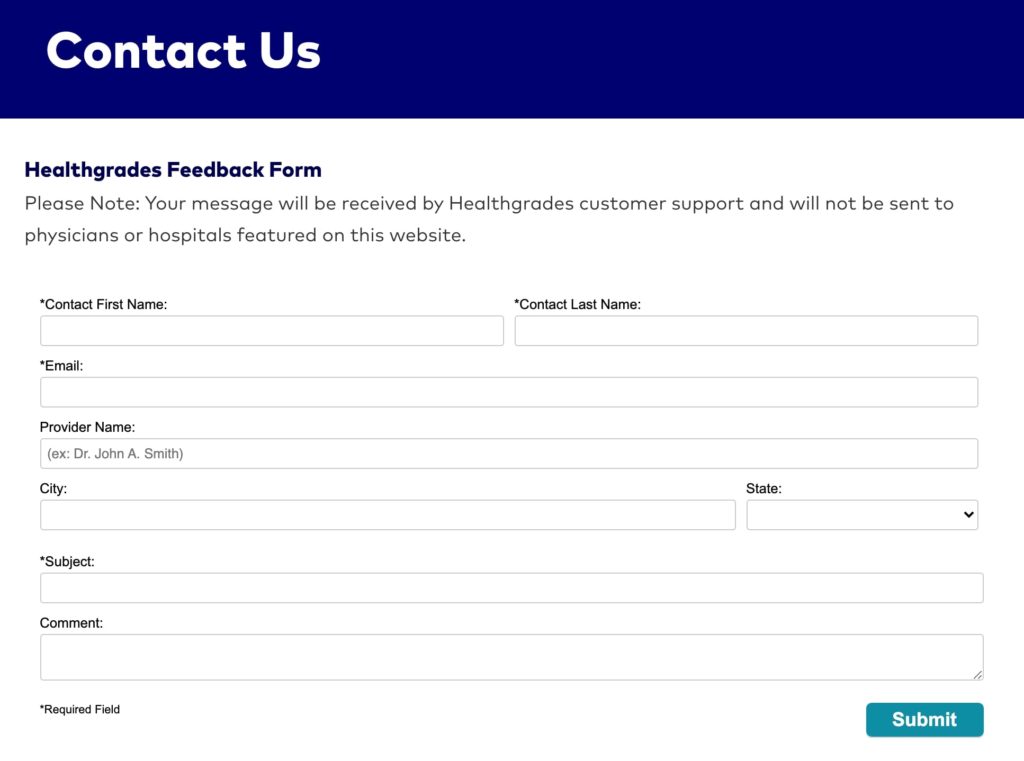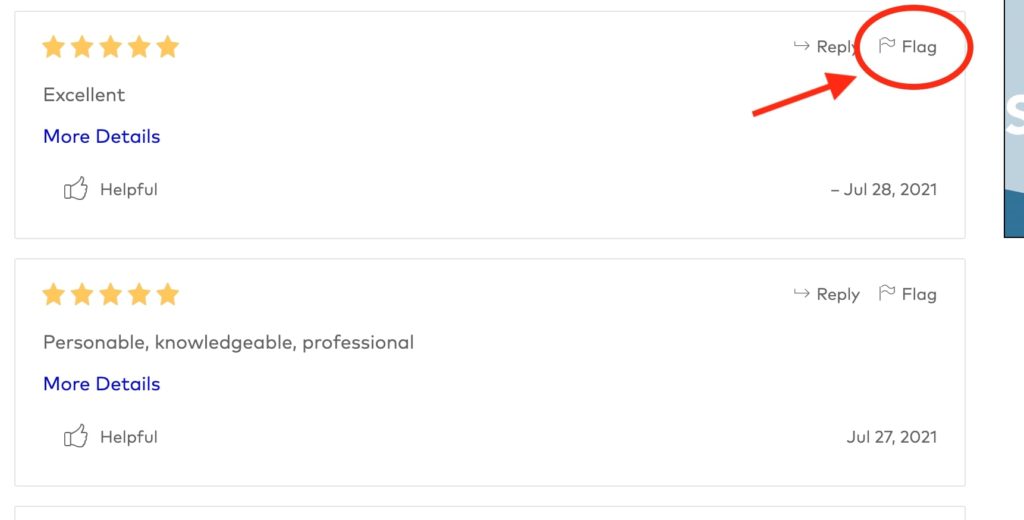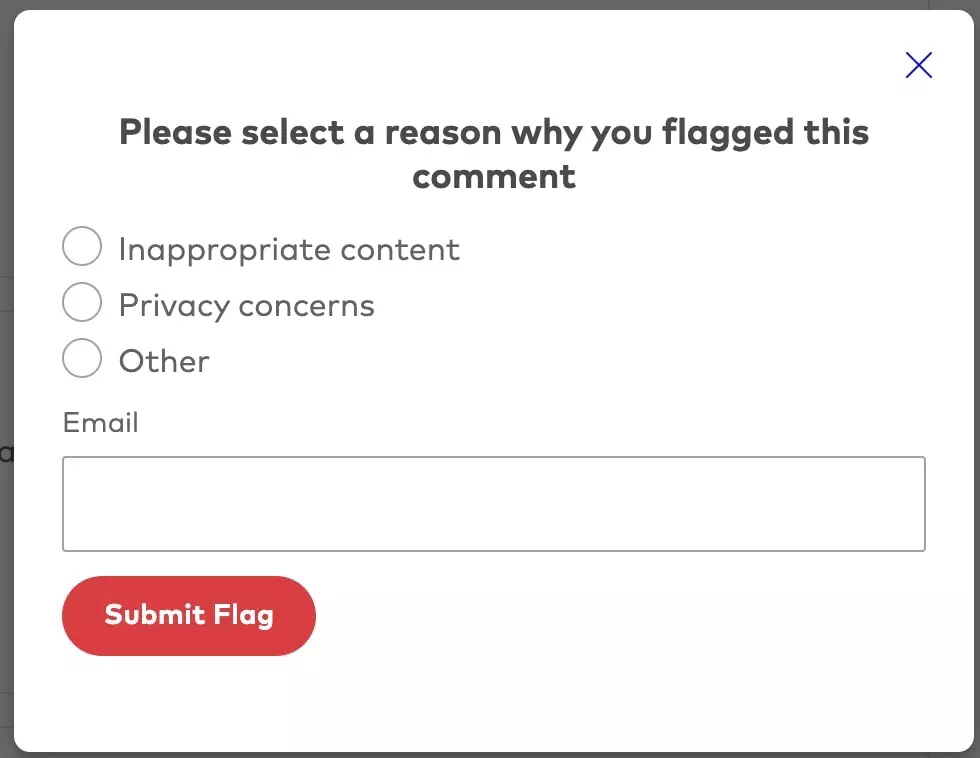
How to Remove a Negative & Fake Healthgrades Review
This page has been peer-reviewed, fact-checked, and edited by qualified attorneys to ensure substantive accuracy and coverage.
Receiving fake Healthgrades reviews could have grave consequences for your medical practice. These reviews could shake your patients’ trust in your expertise, professionalism, and service. To remove negative or fake reviews from Healthgrades, we recommend taking the following steps:
- Understand HIPAA and other confidentiality obligations before proceeding with removal;
- Assess if the review violates Healthgrades’ Community Guidelines;
- Contact the reviewer offline and offer to resolve the issue (if they are a real patient) – this should be done with extreme caution;
- Flag the review by clicking the ‘Flag’ in the upper right corner of the review;
- Report the review using Healthgrades’ online contact form. You can also email useragreement@healthgrades.com or reviews@healthgrades.com;
- Pursue legal action to have the review removed by filing a defamation action and obtaining a court order.
At Minc Law, we have seen countless physicians and medical professionals deal with fake reviews that mischaracterize the reviewer’s real experience at a medical office. Sometimes, negative reviews are posted by an individual who was never a patient, but who has a grudge against the physician in question.
Addressing negative medical reviews can quickly become a legal and ethical minefield, which is why our experienced internet attorneys help clients form a comprehensive response plan while also navigating HIPAA confidentiality issues.
In this article, we discuss the consequences of negative and fake Healthgrades reviews. We demonstrate how to spot fake patient reviews, and how to respond to reviews legally and ethically. We also list several helpful strategies to have fake reviews removed.
Let us help you explore your legal options and craft an effective strategy.Fake reviews harming your business?
Impact of Negative & Fake Healthgrades Reviews on Your Medical Practice
In today’s digital age, most medical patients rely on the internet to decide which healthcare provider to visit. In fact, 90% of healthcare patients use online reviews to evaluate providers. And 84% of consumers consider reviews to be as trustworthy as personal recommendations.
Since online reviews shape customers’ decision-making, poor reviews could quickly damage your medical practice.
Common Consequences of Poor Medical/Patient Services
Patient service is the most important factor in your medical practice’s success. The best marketing strategy or pricing policy in the world cannot overcome a dissatisfying patient experience in your office. Over time, if not corrected, poor medical services can lead to:
- Bad press,
- Decreased foot traffic and fewer patients overall,
- A decreased bottom line as a result of less business,
- Loss of existing appointments due to cancellations and no-shows/no-calls,
- Long-term patients switching to another medical provider,
- Worsened public view of your medical practice,
- A negative influx of online reviews.
While long wait times and unprofessional behavior can immediately turn a patient off, several positive characteristics can turn the patient experience into one worthy of a five-star review.
What Do Patients Look For in Health Care Services?
When visiting their medical provider, most patients expect to see the same general attributes. For instance, the demeanor of the doctor can make all the difference. A provider who is friendly, communicative, and demonstrates that they care for the patient is usually one who incentivizes a long-term doctor-patient relationship.
In an environment where medical professionals are often forced to rush from one examination room to another, patients want to see that the doctor is willing to take the time to truly listen to the patient’s story and give the right amount of attention to their needs. After all, the term ‘care’ makes up half of the word ‘healthcare’.
At Minc Law, one of the most common complaints we see is when doctors are perceived as not caring for their patients. A profession that lends itself to stoicism can often make patients feel like a number.
Therefore, medical professionals can often avoid bad reviews by making their patients feel like they are cared for, whether that is by sending a personal note, following up directly, or simply taking the time to listen and build a rapport with the patient.
At the end of the day, your patients are consumers, and a large part of running a business—any business—should be determining what your consumers want.
Minc Law Tip: While you may only be considering certain aspects of your practice, it is crucial to take your entire practice into account when predicting patient desires. Plenty of doctors have received negative reviews complaining about what was on television in the waiting room or the cleanliness of the building. These complaints have nothing to do with the medical service provided to them—but still, they contribute to patients’ overall experience in the office.
How Fake & Negative Reviews on Healthgrades Can Harm Your Medical Practice
Fake and negative reviews on Healthgrades can expose your practice to regulatory investigations, which, in turn, can result in fines and other disciplinary actions.
Negative reviews can also compound each other. Some users that leave bad reviews add “If you don’t believe me, then look at other bad reviews” to the end of their posts. This kind of invitation can create unwanted dialogue and references to other bad reviews, and can potentially cause the negative-review floodgates to open.
And once a user escapes consequences from posting one fake negative review, they often feel empowered to write several more. Therefore, it is important to get out in front of such negative attacks.
How Reliable Are Healthgrades Doctor Reviews & Ratings?
Review sites are intended to be resources for consumers to evaluate businesses before doing business with them. Healthgrades itself states that “By providing a trustworthy and transparent review process, Healthgrades empowers patients and providers alike to achieve better care.”
But unfortunately, many medical experts have expressed concern over the reliability of Healthgrades.com’s five-star ratings system—mainly due to its lack of transparency and the methodology behind the reviews.
For example, information published in the Journal of the American College of Surgeons (2010) found significantly different risk-adjusted mortality rates between a US News and World Report and Healthgrades.com’s lists of “Best Hospitals.” A similar study in the following year published in the Archives of Surgery affirmed the above discrepancies cited substantive issues and flaws in the assessment and evaluation of mortality rates following specific procedures.
Additionally, there have been reported instances of false physician disciplinary records and information being posted on Healthgrades.com. A 2016 Consumer Reports article also found an alarming omission of information and disciplinary actions on Healthgrades.com, ultimately finding Healthgrades failed to include 18 malpractice suits against one physician.
Looking to enhance your hospital’s reputation? Dive into our insightful article, ‘Hospital Reputation Management: How Healthcare Professionals Can Foster a Positive Hospital Reputation‘ to discover the essential steps.
How Do I Respond to a Negative Healthgrades Review?
Receiving a negative patient review on Healthgrades can be upsetting and worrisome. Your first instinct may be to hit “Reply” and fire off a defense of your practice or your professional behavior. But before you take any action, we recommend pausing and reviewing what you can—and can not—legally and ethically do as a physician when responding to negative reviews online.
In the video below, Attorney & Founder Aaron Minc covers 1.) Best practices for how to respond to online patient reviews, 2.) When it’s time to hire an attorney to help, 3.) How much it costs to hire an attorney to help remove patient reviews, and 4.) Proactive steps you can take to bolster your medical practice’s online reputation.
Video: How Medical Professionals Can Remove & Respond to Negative Patient Reviews

Can Medical Professionals Respond to Reviews on Healthgrades?
Unlike typical businesses that can respond however they want, physicians and medical organizations are extremely limited in what they can say when responding to a negative or fake online review. In short, we DO NOT recommend that physicians respond to online reviews.
Under the Health Insurance Portability and Accountability Act of 1996 (HIPAA), the only types of responses to online reviews that healthcare professionals are allowed to make are simple statements about general practices and procedures. As a physician or medical organization, you are prohibited from:
- Acknowledging that an individual was a patient,
- Identifying the patient using their name, and
- Discussing individual patient outcomes, procedures, and experiences.
Medical professionals can be fined for violating HIPAA regulations when responding to online reviews. In 2020, one Dallas dental practice was fined $10,000 for disclosing patient health information in response to a negative Yelp review.
You should also be aware that there are also state laws that regulate this area as well; HIPAA is simply the overarching federal law, but many states have medical and consumer privacy regulations that physicians should be careful not to violate.
Also, remember that some reviews are not the most credible, so you should be careful before giving a negative patient review more airtime. Responding to negative reviews can often amplify something that readers would otherwise take with a grain of salt.
For further guidance, we recommend reading our comprehensive article by attorney Andrew Stebbins explaining how medical professionals can respond to negative patient reviews of doctors.
What Doctors Should Avoid When Responding to Online Reviews
If you do decide to respond to the poster’s review, you must be extremely careful not to violate any HIPAA regulations. Do not address the poster directly—even by saying something as simple as “Thanks, John” when the poster identifies themselves as such.
It is best to respond only in general terms about your practice’s policies and procedures. Keep these tips in mind when interacting with online reviews:
- Never identify a patient by name or use any part of their medical history as facts to refute their claims.
- Avoid responding publicly; it is always best to resolve the issue privately, when possible.
- Do not respond impulsively or when you are feeling angry or defensive. Instead, wait to compose a response until you have calmed down.
- Do not republish positive reviews on your website without the author’s consent.
Avoid Using Restrictive Contracts to Prevent Patients From Leaving Reviews
In recent years, it has become a trend for doctors to use restrictive contracts prohibiting patients from leaving reviews and generally limiting their ability to speak out about their medical experiences. This practice has not been fully reviewed by courts, but there is guidance that would suggest such a practice could be considered unlawful.
According to the federally enacted Consumer Review Fairness Act of 2016, a contract that impedes customer reviews is considered void if it “prohibits or restricts” or “imposes a penalty or fee against” an individual for engaging in a written, oral, or pictorial review.
Non-disclosure or copyright provisions in doctor-patient contracts are a ticking time bomb of a PR nightmare waiting to happen; therefore, we recommend that you avoid such tactics.
Example of a Medical Professional’s Review Response That Violates HIPAA
Let us imagine that a patient calling herself “Jane” has posted a negative patient review claiming that you made her wait over an hour to see her, and then rushed through her appointment without explaining her diagnosis clearly.
A response that would violate HIPAA might look like this:
“Hi, Jane. We are sorry you had to wait for your appointment at our office. Our office was very busy that day due to being short-staffed, but we did our best to get everyone in and out as efficiently as possible. We were still able to get you a flu-shot within 15 minutes of your appointment time and apologize we could not get you in and out sooner.”
This response addresses the poster by name, and by alleging that Jane is a patient that came to the office and reveals a medical procedure performed on her. Nearly everything about this response could be viewed as a violation of HIPAA.
Example of a HIPAA-Compliant Review Response
On the other hand, a HIPAA-compliant response to Jane’s post might look like this:
“Thank you for your comments. We know each patient’s time is valuable, so we make it our top priority to see each of our patients at the scheduled time of their appointment. Another one of our priorities is to be clear and helpful to all our patients, which is why we carefully go over the results of a visit with them in person, then print instruction packets for them to take home.
We value your feedback and would love to discuss your concerns further! Please contact our office manager at XXX-XXX-XXXX.”
This response addresses “Jane’s” post in general terms by stating the office’s policy, but without confirming or denying that she had been in the office at all. It then invites the poster to call the office for a more in-depth discussion of her particular concern.
Include a Disclaimer on Your Website
Since we generally recommend against responding to reviews at all, we also recommend including a disclaimer on your medical practice’s website and popular patient review sites stating that you cannot discuss individual patient experiences on the website. Below is a basic disclaimer to use on your medical practice’s website:
“Dear Patients,
We greatly value patient feedback and appreciate that online reviews are a useful tool that consumers use to educate themselves and select medical services.
However, please be aware that as medical professionals, unlike other businesses who may respond freely to online reviews, we must provide complete confidentiality to our patients.
That means we are prohibited from responding in any way that acknowledges whether someone has been in our care. If you have an issue that needs attention, please contact our office directly.”
Of course, HIPAA privacy regulations can make it difficult to report fictitious reviews to platforms like Healthgrades. Physicians must always strive to keep from identifying their patients or releasing any protected health information.
What to Do If Your Medical Practice Receives a Negative Review on Healthgrades
If your practice has received a negative or fake review on a platform like Healthgrades, you may want to take some or all of the following steps:
- Preserve the review. Take screenshots, print web pages, and document the review in whatever way(s) you can.
- Document any evidence of damages caused to your medical practice.
- Act quickly if the review is of a serious nature. If the post makes serious allegations such as malpractice, harassment, racism, or other discrimination, it is even more important to take immediate action.
- Consider leaving the review alone if just a one-off bad review in a sea of good reviews.
- Practice great customer service. Demonstrate that you care about your patients’ satisfaction and well-being. Invite the poster to come up with solutions of their own (for instance, by asking “Is there anything we can do to resolve your concern?”). By leaving the dialogue open, you can generate useful dialogue with the reviewer.
- Flag and report the review. This process is addressed in detail below.
- Search and monitor similar health care review websites for the same or similar reviews. You will want to determine if the negative review is a coordinated attack or a one-off event.
- Consult your business records to find out if the review is from a real patient or if it is fake (this process is addressed below).
- Reach out to an experienced attorney to help you deal with the situation quickly and efficiently. We address this step in greater detail below.
How to Spot Fake Reviews on Healthgrades
In this section, we describe why posters would wish to create a fake or negative review, and then discuss seven ways to tell if a review has been fabricated.
Reasons Someone Would Write a Fake/Negative Review on Healthgrades
There are a few reasons why a Healthgrades user would consider posting a fake or negative review. If the review is fake, it may be a hit job by a competitor, or it could have been posted by an individual with a personal reason to attack you or your business.
If the review was posted by an actual patient, they may have had a bad experience at your office—or they may just want a refund.
How to Tell if a Healthgrades Review is Fake
It is not always easy to determine whether a post on a review platform is based in reality or not.
Because of the anonymous nature of review sites like Healthgrades, it is easy for posters to create “embellished” versions of their real experiences to make them sound worse than they were. Or, posters may create completely fabricated stories of a bad experience at your office, when they have never even been a real patient.
Below are several effective strategies you can use to spot fake reviews:
1. Consult Your Business Records
First, if the poster gave their name in the review, it should be simple enough to check your business records and determine if the poster seems to be a real patient of yours.
Check your phone messages and records for any complaints that describe similar stories as laid out in the review. If no one has called your office to complain of a similar issue, the review may be fake.
2. Research the Account Behind the Review
Does it look like the reviewer created their Healthgrades profile on the same day they posted the review? Have they only reviewed your business and no others? These situations could be red flags that the reviewer is not authentic.
3. Look for Suspicious Accounts & Usernames
Many fake reviewers hide behind a play on words as their username, such as “Seymore Butts” or “Ben Dover.” Or, they may choose a generic first name with an initial, such as “John S.” These types of usernames could be a sign that the reviewer was never a real patient.
Questionable usernames may also be accompanied by a “humorous image” or stock photo. Conducting a reverse image search on Google is an effective way to identify the source from where a profile’s picture or avatar was copied.
4. Analyze the Review’s Timing
Check the timestamp for the review. If it was posted in the middle of the night in your customers’ time zone, it could be a sign that the review was not posted by a legitimate patient.
5. Is the Review Part of a Large Volume of Bad Reviews?
Are you receiving negative reviews on a weekly or monthly basis? Are you suddenly receiving a stream of one-star reviews when you are used to receiving a high average rating? These events could be a sign that the reviews are a coordinated attack on your business.
6. Consider the Language Used
Next, think about how the review itself is worded. Is there an unusual amount of grammar errors or typos? Does the review appear to be promoting a competitor? If so, the review may not be from an actual patient.
7. Look for Signs of a Professional Hit Job
In some rare cases, fake reviews are created by professional review “hitman” agencies that are hired by a business competitor. These agencies are often located outside the U.S., which means that a good way to spot them is to check for poor use of English.
Hit-job reviews also typically use vague language, since the reviewer does not have firsthand knowledge of the target business.
Are Healthgrades Reviews Anonymous?
While Healthgrades does ask for a poster’s name and city and state of origin, identifying personal information is not required in order to leave a review. A poster can leave those sections blank, which will result in an anonymous review.

How to Remove Fake & Negative Reviews on Healthgrades.com
Spotting a fake review is only half the battle; because of the potential damage poor reviews could have on your business, it may become necessary to have that review removed. Below, we discuss strategies for removing false and damaging reviews on platforms like Healthgrades.
Check to See if the Review Violates Healthgrades Community Review Guidelines
Because review websites like Healthgrades have their own user agreements and guidelines, it is important that all users abide by those rules.
The Healthgrades Community Guidelines outline the rules for posting reviews, as well as the types of reviews that may be rejected or removed. Healthgrades encourages users to report reviews that appear to violate the guidelines, and the platform reserves the right to reject and remove such content.
Some of the most significant violations include:
- Posting libelous, defamatory, harassing, threatening, or inflammatory content;
- Posting misleading, deceptive or fraudulent content;
- Using obscenities or posting obscene content;
- Expressing intolerance based on race, ethnicity, nationality, gender, gender identity, religion, sexual orientation, age, or disability; and
- Impersonating other individuals or organizations.
How Do You Remove Negative Reviews From Healthgrades?
Before taking any further action, it is a good idea to try asking the original author to remove the review. If the reviewer is a real patient with a real problem, resolving their complaint could be the simplest solution to having that negative review removed.
Whether it means replying to their review and inviting them to call your office, or reaching out to them yourself through other means (if you know who they are), providing excellent customer service can go a long way.
Flag & Report the Review
If cooperating directly with the reviewer is not an option, your next step should be to flag and report the review with the respective website for a Terms of Service violation. You can do this on your own or with the assistance of an attorney.
Healthgrades has an online contact form that you can use to explain the situation:

You can also email useragreement@healthgrades.com or reviews@healthgrades.com directly with your concerns.
Another option is to flag a review from the review page. To do this, navigate to the review in question and click Flag in the upper right corner of the physician review.

Select a reason why you flagged the review and add any comments that you wish, and then click Submit Flag.

As always, when reporting reviews, keep HIPAA and confidentiality regulations in mind. Even when making a report to a private third party, you must always be careful not to reveal identifying or protected medical information about a patient.
At Minc Law, when we contact any review site to report negative or fake content, we make sure to use the platform’s own language to report terms of service or community guidelines violations. Using the language expressed in the platform’s own guidelines helps make it more likely that the platform will cooperate in reviewing the request and removing the unwanted content.
Consult an Internet Defamation Attorney
Next, it may be helpful to hire an experienced internet attorney to help you contact the review platform for flagging and reporting purposes.
Many online platforms have a legal representative, even if that individual is associated with a parent company. Experienced internet attorneys like those at Minc Law subpoena these platforms often enough that we are familiar with their legal representatives—meaning if we cannot get results directly from customer service or the intake team, we can often send an email to their legal contact, who will escalate the request and see that it is removed.
Keep in mind that if the situation merits communication between the physician and the medical board, that process should be handled by the medical practice’s in-house counsel, not an internet defamation lawyer.
Pursue Legal Action
If you need to take legal action against an online review, please note that federal law only allows you to sue the reviewer, not the website. A lawsuit filed against the website will likely not be successful because of Section 230 of the Communications Decency Act. Section 230 protects websites from being considered the publisher of content authored by others.
If the reviewer you sue was a real patient but is lying about some portion of their actual experience, pursuing legal action—such as filing a lawsuit and/or obtaining a court order for the review’s removal—can be a very thorny issue.
Dealing with anonymous fake reviews is a very complicated area of the law, so your attorney should analyze your options on a case-by-case basis to determine if legal action is appropriate. For example, pursuing legal action may not always be worthwhile if the review in question is an outlier, did not cause significant damage, and you are otherwise receiving many positive reviews.
It may be time to pursue legal action if you begin receiving many harmful reviews from seemingly the same source—or if the reviews are serious in nature, such as if they accuse you of:
- Malpractice,
- Harming a patient,
- Engaging in criminal activity,
- Sexual harassment, or
- Racism or other types of discrimination.
In some situations, your attorney may suggest filing a defamation suit (or a John Doe lawsuit if the reviewer is anonymous) to facilitate the review’s removal. As always, it is important to move forward with caution regarding HIPAA regulations if the anonymous poster turns out to be a real patient. In the video below, we go over the steps of unmasking anonymous online defamers through the filing a John Doe lawsuit.
Video: How to Identify Internet Users Behind Anonymous Harassment & Defamation

How an Online Defamation Attorney Can Help Remove Fake Reviews
As a physician, your reputation must be one of integrity, professionalism, and expertise—and whether you like it or not, online reviews can have a big impact on your well-guarded reputation. It can be difficult to know how to remedy the situation when your practice is attacked by malicious and fake reviews. Thankfully, you do have options.
Even though HIPAA regulations make it difficult to navigate responding to negative posts about your business, it is still possible for you to identify and remove fake reviews. You can consult your business records, look for the signs of fake reviewer profiles, and take steps to flag and report the damaging content to the platform.
You can also consult an experienced internet defamation attorney to help you take further action. At Minc, we have extensive experience working with review platforms, presenting court orders, and even filing defamation lawsuits to have harmful and fake reviews removed as quickly as possible. We also possess an arsenal of investigative tools and techniques to identify anonymous reviewers to hold them accountable.
★★★★★
“We were under pressure to resolve an unfavorable Yelp review. Our Minc team was empathetic, efficient and got the job done quickly. We now have a lifeline when an on-line review becomes problematic. Many thanks to our wonderful team!”
Ellen Adams, June 13, 2021
If your medical practice is the target of fake or negative patient reviews, we can help you. To schedule your free, initial no-obligation defamation consultation with an intake specialist, call us at (216) 373-7706 or fill out our contact form online.
Video: Online Medical Review Removal Client Testimonial – Dr. Davis




